#I need to draw him with peri and turlough too!
Text
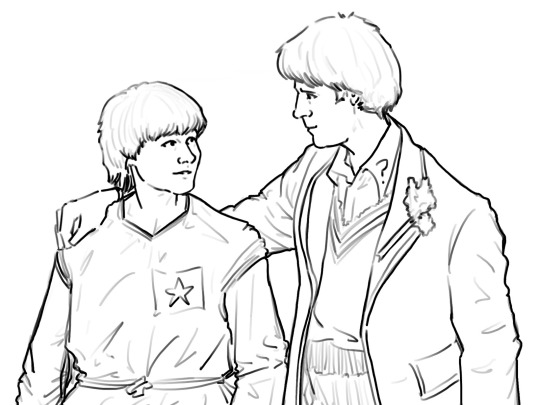
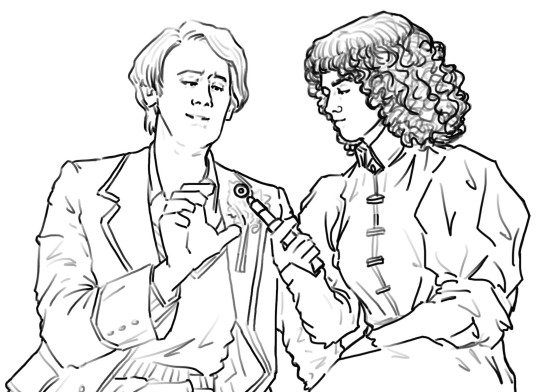

i quite like the line art for these so have fivey’s children
#I need to draw him with peri and turlough too!#fifth doctor#5th doctor#Peter Davison#adric of alzarius#Tegan jovanka#nyssa of traken#Sarah Sutton#matthew waterhouse#Janet fielding#season 19#classic who#doctor who#my art#fanart#minsart
257 notes
·
View notes
Text
Planet of Fire by Peter Grimwade
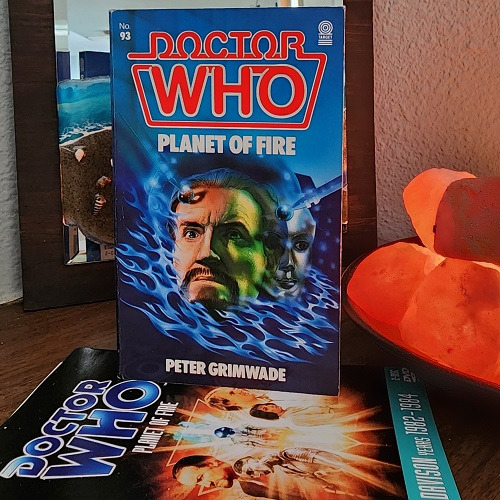
‘Don’t be worried my boy,’ continued the old man. ‘It can be a most rewarding experience, and a blessed relief for those who are consumed in the flames. Doubters are such unhappy people.’
‘Is it not sometimes good to doubt?’ asked Malkon gravely.
The time-travelling Doctor in need of a holiday lands on a beautiful island on Earth. But there’s little rest as a surprising connection soon surfaces amongst his companion Turlough holding back secrets, the malfunctioning shapeshifting android Kamelion, and a near drowned American tourist called Peri. Soon all are on an unplanned trip as the TARDIS is whisked to the volcanic planet of Sarn. There the inhabitants are facing catastrophic disaster while enmeshed in religious frictions. Moreover, and perhaps worst of all, is the appearance of the evil Time Lord the Master.
The requisites for Doctor Who’s 1984 Planet of Fire, as it has been succinctly put by its writer Peter Grimwade, ‘was the story’. A narrative seeing more than one character leaving, a new companion—and American at that, the Master for an antagonist, plus the very real island of Lanzarote. For someone such as Grimwade involved with Doctor Who in different capacities going back to the 1970s it also marked more than one end. It would be the director Fiona Cumming’s last for the TV series too.
So, forty years on what to make of Planet of Fire?
Shall we start by saying it is kind of hot? Not just fiery volcanic desert island hot but with heated issues and underlying eroticism.
Also, male homoerotism. Grimwade’s novelisation begins with a scene not in the show of an Ancient Greek vessel going down in a storm, during which one of its male merchant passengers from Rhodes clutches a kouros (i.e. young nude male statute) of the god Eros to quote ‘like a lover’. This paired centuries later by an alien Trion spaceship likewise going down on another planet. But not before releasing emergency beacons, small metallic mushroom shaped objects exhibiting a triangle symbol, one to end up of all places on Earth of course. Then, as seen on screen, both kouros and beacon to be lifted from the ocean by an archaeological team in the later part of the 20th century.
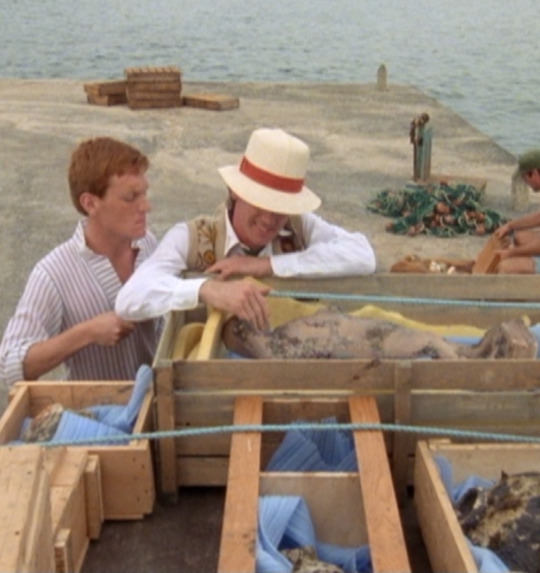
It bears mentioning Grimwade was gay, among other names involved in this story and Doctor Who. Additionally, he did love Greece and so envisioned the earthbound setting of a fictious Greek isle. Notably the earthly paradise goes unnamed in the novel, but the location filming for the serial instead was on one of the famous Canary Islands. For the classic series only the third filming destination used outside the UK and further farthest chosen at the time. Grimwade, however, was merely given photographs for his purposes. Frustrating it would also seem as he later judged the serial not working well on the screen given the cost and an excuse to go ‘on a gang bang and a nice holiday!’ Unsurprisingly too, by his own admittance had he experienced the place himself the ‘story would have been utterly different’. One can ponder how, but various details (some the writer was aware of) certainly stand out. Although the Canary Islands were known to the ancient Greeks, archaeological evidence, such that draws Peri’s professor stepfather accompanied by family, reveals Roman contact rather than Greek and further later than the period referenced.
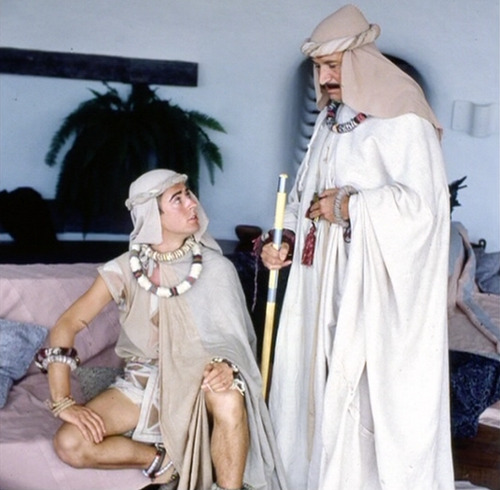
Plus Lanzarote also does double duty for the volcanic alien world of Sarn. Grimwade may have spent a lot of time writing about aliens, but his style is one with its roots in reality. Is it surprising for a someone like him to say, 'I find it virtually impossible to write about aliens.' and 'in terms of creating an alien culture, I find it an empty exercise.' Writing on a truth (influences of classical antiquity again speckling Grimwade’s writing) Lanzarote is more contemporarily a Spanish island. But if one wanted to draw inspiration for culturally developing the people on Sarn from an older indigenous population, there are the mysterious Guanches related to the Imazighen more than the Bedouin. Since colonisation also comes up in the story interesting for the anti-colonial implications. Or ideas of the barbarous for that matter. Though the costume designer John Peacock apparently did look to ethnically complex North Africa. The aesthetics can unfortunately combine into a reading of Arab. Further the conception of the Sarns is another plot point that varies from screen to novel. One that could pose discussion on how self, and culture are formed and defined.
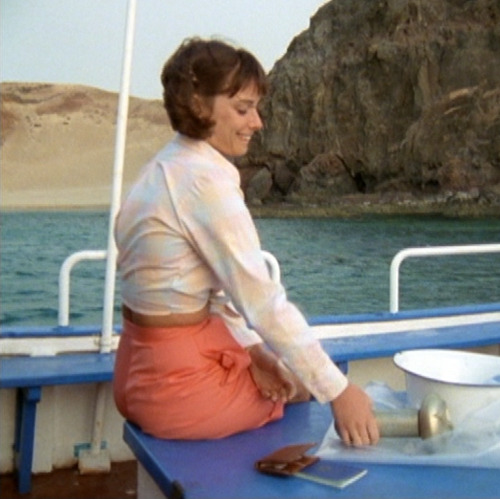
But back to the eros for a moment, on screen it’s visually clear the new companion character of Peri is supposed to, well, sex up things a bit. Peri (full first name Perpugilliam) Brown was outlined as an 18-year-old college student majoring in botany and, American. (Though portrayed by Nicola Bryant an English actress new on the scene with dual nationality due to marriage.) Grimwade also expressed ‘Writing for the Americans wasn’t easy either—you kind of resort to cliché ’.

Too Peri’s 40-year-old stepfather (though first imagined as older until Dallas Adams was cast) apparently the stuff of nightmares. A few lines of Peri’s would lead to speculation of an abusive childhood. (The exact nature of the abuse theorized as sexual goes back at least to the later 1980s. But not until closer to two decades later would a couple authors eventually expound on this in print form.) For its part the text of the novel version of Planet of Fire reads on the recurring nightmare how Peri was a little girl ‘sent to bed in disgrace’ pleading for Howard to not ‘put out the light’. Also later characterizing Howard’s persona with a ‘vein of ruthlessness’ through Peri’s strong emotions transferring on the automaton Kamelion who at points takes on the Howard disguise. In any event, retrospectively Peri’s character was unfortunately quickly overshadowed by the direction of the programme.

Nor did it go unnoticed for Planet of Fire that Turlough’s too dressing lighter for the climate and shedding some clothes. But to be serious the story is in large part finally Vislor Turlough’s backstory and send off. So Grimwade was a fitting, if in the end ironic, choice having been tasked to introduce the character back in 1983’s Mawdryn Undead. Carried off too with greater effect than the short lived Kamelion, meeting its demise in Planet of Fire, a real robot which had become more of a technical complication than an interesting companion. Plus, Turlough is the latter. Or cut from a different cloth at least. In Mawdryn Undead an alien mysteriously trapped in an English boys’ school on Earth. (The college used actually one Grimwade attended himself.) So desperate to escape (even not much caring if it was by death) clad in a similarly somber uniform coming under the cruel influence of another enemy of the Doctor, the Black Guardian, who tasks him to kill the Doctor. Through ten stories Turlough’s faults, though failing in murder cannot be counted as one, and his eventual progression to friendship with the Doctor brought something. Thanks to his actor Mark Strickson too. Even if companions were restrained and crowded out by other priorities as happened, the question of just what was going on with Turlough was a question. Flipping around more than the Doctor’s question mark suspenders changing direction in shots. While Turlough’s more the imperialistic brat in the novel, at points even using derogatory language, at the same time there are some really affecting moments involving him in Planet of Fire I wish were also on screen.
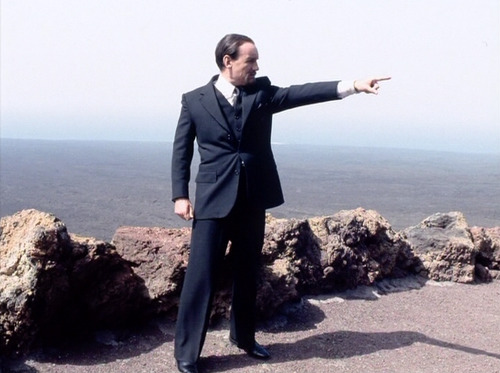
Speaking of reveals, it’s an intriguing choice the novel cover features an illustration by Andrew Skilleter of the Master (Anthoy Ainley) with Kamelion, two faces in a composition reminiscent of the Roman god Janus. Planet of Fire does offer the Master as a twofold villain. Ever demanding obedience, and largely enjoying every second of wielding influence at points booming ‘like a hell-fire preacher’. Bringing added turmoil as the Sarn Elders first believe he’s sent from their Fire Lord.
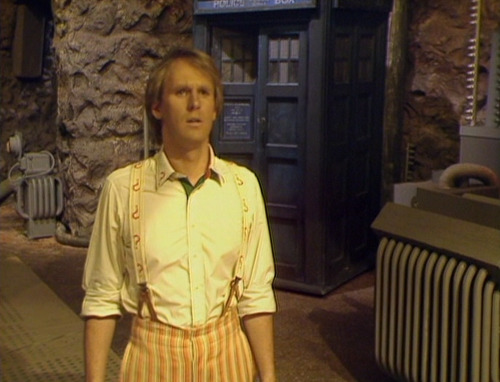
Contrasted by the Doctor once again attempting to allay superstition and avoid loss of life both in violence and cataclysm. A conversation between the Doctor and the Unbeliever Amyand (James Bate) on the mountainside about the Sarns, again because their origins vary between versions, goes much differently. Then if one tries to sum up Peter Davison’s Doctor in one word (though that wouldn’t do him justice) it’s probably akin to ‘nice’. So, the Doctor’s actions near the end of the story are memorable. The novel offers more insight into the Doctor’s dissonant emotions before ashen he resumes the reassuring ‘I’m… okay.’ Another much interpreted last line by the Master ‘Won’t you show mercy to your own…’ is replaced. As well the show’s poignant final scene with the, preoccupied with burning oblations, Chief Elder Timanov (Peter Wyngarde) and his faith the biggest divergence.
Then zealotry is too an important theme. As Grimwade put it ‘interested in the extremities people go to with their feelings about religion and ideology.’ The novel peppers the text with references to Greek myth, Israelites, Christianity, Islam and even an in-universe nod to the Sisterhood of Karn. But apparently a subject too hot to handle by direction from the show’s script editor, Eric Saward, the religious situation on Sarn ‘couldn’t be too strong an issue.’ At a time when audiences could easily look around them for parallels (even today), a decision that was wise or a loss? As Grimwade reflected ‘there’s a lot of very deep experience that the programme has touched on in an oblique way.’
In the end it must be more than coincidence that my favourite stories of the Fifth Doctor’s era were either directed or written by Grimwade. And if directing and writing were two different skills, they were at least linked in Grimwade’s mind as he described in writing ‘you’re directing the ideal’. Too novels gave an opportunity where ‘a lot of shortcomings can be rubbed out’. Particularly the novelizations of those serials Grimwade wrote, he once claimed were ‘the best thing about his creative involvement with the world of Doctor Who.’ Sadly, Peter Grimwade would pass away in 1990. But liking to be remembered for his stories, I remember Planet of Fire and him still today.

#scifi#doctor who#planet of fire#peter grimwade#tv novelisation#long post#bookopoly#free choice read#cw: colonisation death and of parent fire incarceration religious frictions racial slur mention civil war allusions to child (sexual) abuse
0 notes